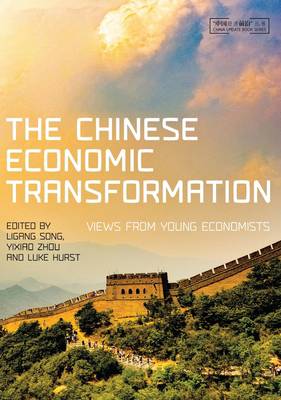
- Retrait gratuit dans votre magasin Club
- 7.000.000 titres dans notre catalogue
- Payer en toute sécurité
- Toujours un magasin près de chez vous
- Retrait gratuit dans votre magasin Club
- 7.000.0000 titres dans notre catalogue
- Payer en toute sécurité
- Toujours un magasin près de chez vous
The Chinese Economic Transformation
Views from Young Economists
66,45 €
+ 132 points
Description
The Chinese Economic Transformation, the 19th volume in the China Update book series, provides an opportunity for young economists to share their views on various issues relating to the Chinese economic transformation. More than half of the contributors to this book are female scholars. Some of the contributors are rising stars in the studies of the Chinese economy and economic transition, and some only recently received their PhDs and are on their way to establishing themselves in the field of China studies. But they have one thing in common: to passionately observe, study and research what is going on in the Chinese economic transformation during the reform period; and, by so doing, make contributions to the policy debates on, and general understanding of, the Chinese economy. The chapters in this volume include an in-depth probe into challenges in capital and credit allocation due to financial friction and policy distortions; investigating the causes of growth slow-down in China and suitable policy responses; the evolution of the household registration system and its impact on off-farm employment and the integration of rural and urban labour markets; the growth, scale and characteristics of nonstandard employment; the development of rural e-commerce and its economic impact; innovation performance of listed enterprises in China; financial services liberalisation and its impact on firms' performance; financing support schemes for small and medium-sized enterprises (SMEs) and the effect on banks' credit allocation to SMEs; the potential costs of US-China trade conflict and ways to mitigate them; gender income gap in China's labour market; causes of blockage of Chinese overseas direct investment and strategies to reduce the probability of encountering obstacles; and the role of state capital in the iron ore boom in Australia.
Spécifications
Parties prenantes
- Editeur:
Contenu
- Nombre de pages :
- 336
- Langue:
- Anglais
- Collection :
Caractéristiques
- EAN:
- 9781760463120
- Date de parution :
- 10-07-19
- Format:
- Livre broché
- Format numérique:
- Trade paperback (VS)
- Dimensions :
- 176 mm x 250 mm
- Poids :
- 762 g

Les avis
Nous publions uniquement les avis qui respectent les conditions requises. Consultez nos conditions pour les avis.





